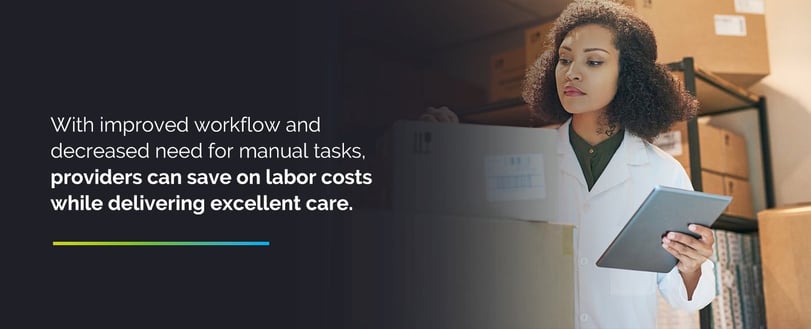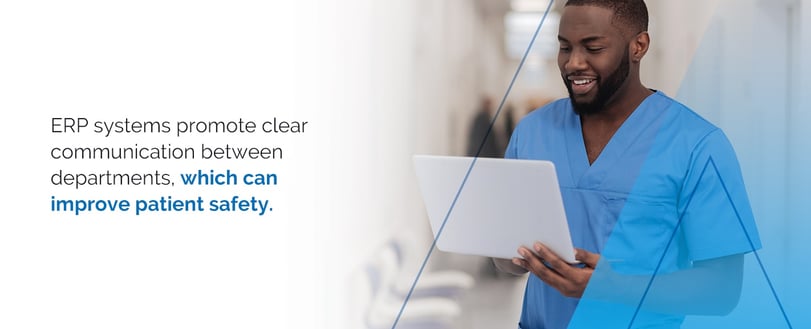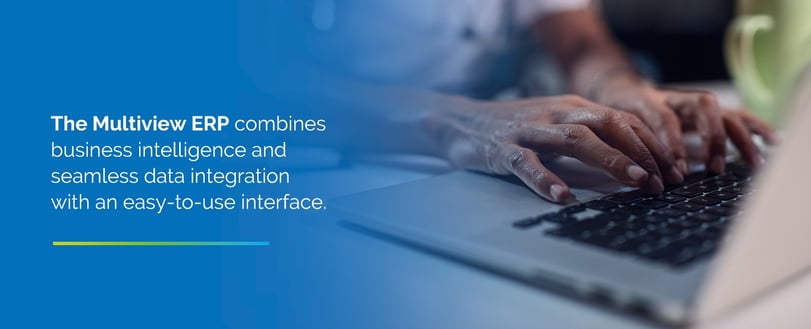Many of today’s healthcare organizations embrace technology to keep patients informed and deliver quality care. For example, according to The Office of the National Coordinator for Health Information Technology, over 95% of hospitals have adopted electronic health record systems. However, with EHRs taking priority, fewer organizations have implemented technology to optimize back-office operations.
It’s never too late to improve. Healthcare organizations can use enterprise resource planning (ERP) software to streamline essential business processes and benefit all stakeholders, including patients. If you’re ready to drop outdated and disparate programs and use an integrated system, it’s time to consider ERP financial software in Healthcare.
What Is Healthcare ERP?
Enterprise resource planning uses sophisticated software to integrate data from various departments and present it in a centralized platform. Traditionally, health providers use separate software programs to manage data in each department. With a healthcare ERP financial solution, you can gather, store and manage facility-wide data to accelerate information sharing and eliminate data silos. While different departments can still use their preferred systems with an ERP financial software in place, they can access data from other areas through a single application and interface. As a result, users get a complete view of business operations with little effort.
Why Do Healthcare Organizations Need an Integrated ERP Financial System?

Healthcare organizations face the challenge of reducing operational costs without sacrificing patient care. An ERP financial system helps health providers overcome these challenges by increasing efficiency and accuracy in all departments. With improved workflow and decreased need for manual tasks, providers can save on labor costs while delivering excellent care.
An ERP in Healthcare also provides increased visibility and access to real-time data, which allows for fast and informed decision-making. For instance, with an ERP in healthcare, organizations can easily track medical supply levels and ensure they always have what patients need, increasing patient satisfaction. According to the Health Care Management Review, there’s a correlation between positive patient experiences and increased profitability.
The ERP Features and Integrations Healthcare Organizations Need
What financial ERP features does your facility need? To maximize an ERP in healthcare, ensure it offers the following.
- HIPAA compliance: An ERP financial system in healthcare integrates data from all areas, including information from your EHR. To avoid a data breach, make sure you choose ERP financial software in healthcare that’s compliant with the Health Insurance Portability and Accountability Act.
- Automation: ERP financial software in healthcare should automate routine activities, like payroll and order processing, to decrease human error and give employees time to focus on other tasks.
- Elasticity: With ever-changing state and federal regulations, select adaptable ERP in healthcare that can stay accurate and up-to-date.
- Real-time analytics and reporting: An ERP financial system with data analytics can help you understand your organization’s operational performance and financial condition so that you can make improvements. Reports might include graphs, charts and other visual representations to help you identify patterns and trends.
- Mobility: Select an ERP financial system in healthcare that allows users to access the software from mobile devices, and you’ll keep productivity levels high.
Also, the Healthcare ERP financial system should integrate with the following tools.
- Financial management: Financial management requires financial data from every department to enable decision-making. Integrated ERP financial software help managers quickly gather and analyze organization-wide data to create budgets accurately, allocate costs and manage payments.
- Inventory management: An integrated ERP in healthcare allows decision-makers to track inventory levels and resource consumption in every department. This increased visibility helps managers identify and reduce wasted resources.
- Accounting: An ERP system with accounting modules, such as an integrated general ledger, enables you to catch mistakes before the end of the month so that you can close financial statements in much less time.
- EHR: ERP software that integrates with your EHR gives you better control over the supply chain and helps you predict what patients and providers need.
All the above features can help your organization make better decisions and decrease inefficiencies.
View the KLAS Research Spotlight featuring extensive interviews with various Multiview clients, focusing on their comprehensive technology report on the Multiview ERP solution.
Integrated Healthcare ERP Benefits
Healthcare organizations handle massive amounts of data every day. These organizations need advanced software solutions, such as an ERP financial system in healthcare, to manage workloads and keep up with trends in health information technology. Here are some other reasons to implement integrated healthcare ERP.
1. Improves Patient Care

When every department in an organization has an improved workflow, better inventory control and fewer documentation errors, it shows in patient care. For example, an ERP’s inventory management integration helps facilities maintain stock levels in every department, meaning employees can spend less time searching for supplies and more time caring for patients. With a Healthcare ERP financial system, employees can also focus less on administrative tasks and prioritize enhancing patient care. Lastly, Healthcare ERP systems promote clear communication between departments, which can improve patient safety.
2. Eliminates Discrepancies
Departmental processes no longer have to exist in a silo. An integrated ERP financial solution for healthcare consolidates data and links departments, leaving no room for discrepancies or confusion. When data flows effortlessly from one department to the next, you can expect increased efficiency and better communication between each team.
3. Streamlines Decision-Making
ERP financial software with a business intelligence module provides fast reporting and graphical visualizations to increase accessibility to detailed data. With easy access to accurate, real-time data, leaders can make decisions quickly and solve problems with a holistic approach.
4. Reduces Operational Costs
An integrated Healthcare ERP system can help your organization save on operational expenses. First, ERP software illuminates issues with productivity, workflow and resources, allowing you to streamline these areas and reduce waste-related costs. Since Healthcare ERP systems enable seamless data exchange and automate back-office tasks, your facility can also spend less time correcting human errors. As the saying goes, time is money.
5. Simplifies Compliance
Healthcare is a heavily regulated industry, and organizations must prioritize compliance to protect patients, employees and the organization itself. ERP financial software in healthcare makes regulatory compliance much easier. With an integrated ERP accounting system, all aspects of your organization are transparent, traceable and easy to access. If you need to provide documentation for an audit, you won’t have to scramble for paperwork. Instead, an ERP financial system places everything you need at your fingertips.
Multiview Cloud ERP

After deciding to invest in an ERP financial system for your healthcare facility, it’s time to find a dependable software vendor. Consider beginning your search with Multiview Cloud ERP. The Multiview ERP software combines business intelligence and seamless data integration with an easy-to-use interface. You can expect:
- An integrated budget and forecasting module with drill-back functionality
- Robust reporting and visual representations
- The ability to auto-reconcile the Multiview ERP with EHR data every day
- Paperless processing and fraud protection
- Electronic bank reconciliations
The Multiview ERP is not merely accounting software. With the Multiview ERP, your healthcare facility can gain insight into each department’s performance and benefit from automated tasks, improving efficiency and decision-making throughout your organization.
Are you worried about a successful implementation? We offer tailored, hands-on training to all ERP users to ensure success. And we don’t disappear after the project’s completion. We provide long-term support to help you maintain ease of use and reach future goals.
Get in touch with us today for a deep dive into our sophisticated security software and financial solutions. Discover our exceptional culture through the insights of our CFO, Justin Winchiu.
Request Your Demo Today
An ERP financial system will help your healthcare organization stay competitive and deliver exceptional patient care. To learn more about the benefits of an integrated healthcare ERP, request your Multiview ERP demo today. Would you like more information first? Please contact us, and we’ll be happy to assist you.




